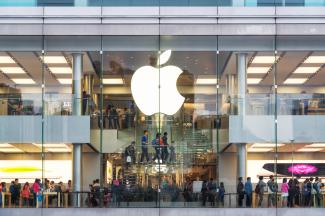
In the run up to the September 12 launch of the latest iPhones, Apple’s legions of fans around the world built themselves into frenzied speculation about what new magic gadgetry the tech giant was set to reveal.
Apple’s highly-anticipated product launches usually generate huge buzz, with scores of customers camping outside its stores to be one of the first to buy its snazzy new gadgets.
While zealous fans play a big part in the success of Apple’s launches, there is something other firms can learn from the way Apple launches its products that fuels this powerful connection with consumers.
Apple’s launches have traditionally been closely-guarded secrets with new products announced at glitzy live events shortly before they were released. The iPod was revealed to the world in 2001 two weeks before it went on sale.
However, when Apple first entered the smartphone market, the company chose instead to announce the new iPhone launch six months in advance of its release. Since then, the company has also announced product launches months in advance for the Apple Watch, AirPods and iMac Pro.
Apple isn’t the only one. Companies like Microsoft, Sony, and Tesla also announce their product launches months in advance to huge success. What makes this approach so effective?
Boost to the brand
In a study at NUS Business School, co-authored with colleagues at the Norwegian School of Economics and the Stockholm School of Economics, we found that consumers viewed a product more favorably when its launch is announced months before, compared to when its launch is announced only when the product is available for purchase. In fact, such early announcements created a more positive evaluation of the product among consumers.
They also improve a consumer’s perception of other products made by the same company, which are seen as being similar to the forthcoming, innovative product and are rated more highly than equivalent competitive offerings.
In other words, positive attitudes towards a hypothetical new, yet-to-be launched iPhone generated by an early announcement may strengthen our preference towards existing Apple products like iPads and iWatch as consumers because we are reminded of their similarities as components of a cool, desirable Apple ecosystem.
This effect is stronger for launches of radically new product lines compared to launches of enhanced versions of existing products.
Fueling consumer demand
Some companies believe announcing a new product early before its launch is a risky strategy that can lead consumers to hold out and stall their purchases, cannibalizing the company’s existing sales. However, our research underscores the utility that an early announcement strategy has in creating stronger consumer preference not only for the new product but also for the entire brand of products.
Apple themselves recognize the benefits of this brilliant marketing strategy. Though it has historically kept its product plans secret only announcing details close to a launch, it now seems to be fueling the approach for an early announcement by building buzz but keeping details secret.
Just like a Hollywood trailer, such announcements fill consumers’ minds with just enough information to keep them intrigued about what’s coming next, leaving no space for thoughts about the competition.
Car makers like BMW have also used the approach to great effect, creating a community of passionate brand followers prepared to make substantial deposits to reserve new models months prior to a car’s actual introduction.
In part, this strategy has also helped to create focus on innovation and inventive aspects of a new product, like Dyson has done by tweeting about the company’s work on a new battery electric vehicle, so that consumers will also be drawn to other products in the brand family and their features.
But make no mistake. Early announcements can be a doubled-edged sword. Consumers are quick to shun brands that don’t live up to their expectations or see their release date pushed back, because these raise questions about the company’s credibility.
Still, early announcement are astute moves. Once an announcement is made, the game is on to keep the momentum going and build an even stronger connection with consumers.

